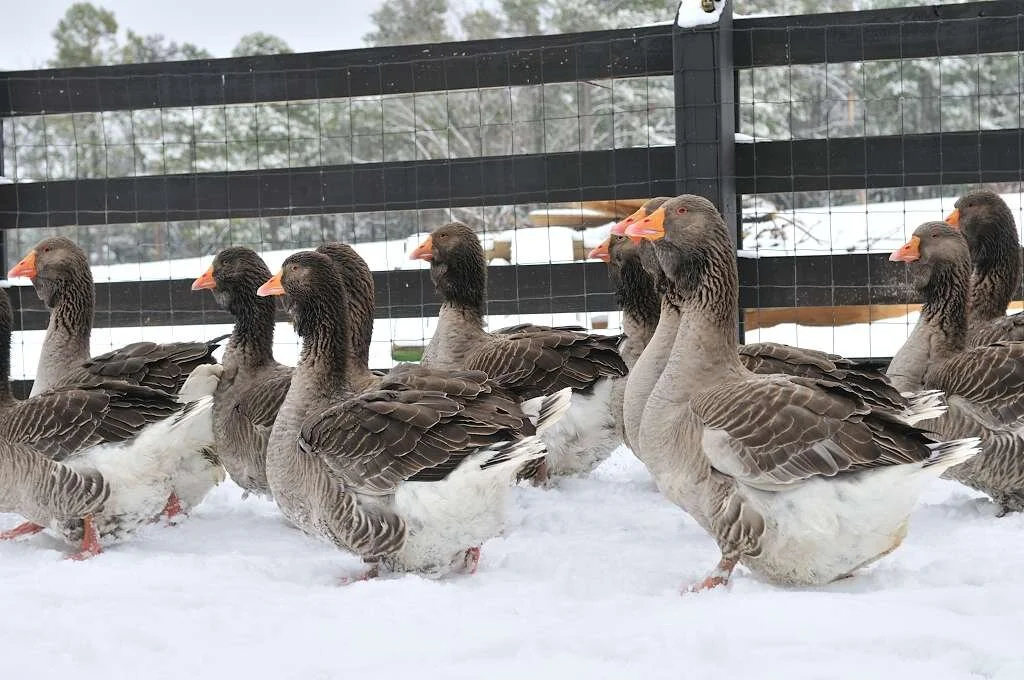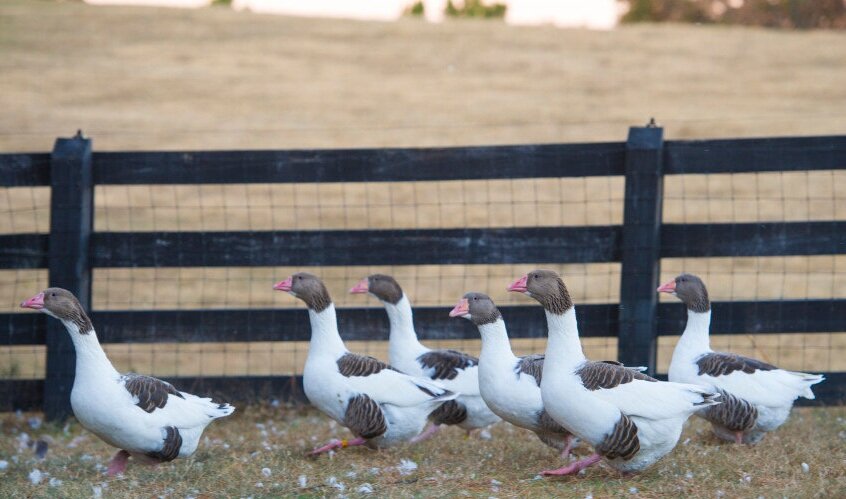Giant Dewlap Toulouse at Moss Mountain Farm
It’s well-founded that standard bred large fowl and quality breeders are in decline, and heritage breeds of geese are no exception. Many reasons are cited for this decline, such as the cost of maintaining flocks of such large birds, as well as the increasing challenges of processing waterfowl for the farm to table market.
At the August 2019 Large Fowl Summit held at Moss Mountain Farm, the Heritage Poultry Conservancy (HPC), American Poultry Association (APA), The Good Shepherd Conservancy, and the Livestock Conservancy (LC) agreed that December would be deemed "Heritage Goose Month.” HPC board member, Dr. Keith Bramwell, said ‘this effort is a way to raise awareness for the need for greater conservation work among geese breeds in need."
P. Allen Smith & a Sebastopol Goose
While some breeds, such as Africans and Sebastopols, enjoy popularity among exhibition breeders and the public, other breeds find themselves in more dire circumstances. Shetlands, Cotton Patch, Roman Tufted and Steinbachers are among those seldom seen in poultry shows, reflecting their small population status. The Livestock Conservancy maintains that six breeds are currently on the critical and threatened lists, meaning among those cited with critical status there may be fewer than 500 breeding birds in the United States, with five or fewer primary breeding flocks (50 birds or more), and an estimated global population of less than 1,000.
In an effort to conserve Saddleback Pomeranians and large Embdens, the Heritage Poultry Conservancy is working with Frank Reese at the Good Shepherd Conservancy to get these breeds back into production. Reese, well known for his work with Heritage turkey varieties, has plans to bring these two breeds of "market geese back to the market, where they belong," says Reese. P. Allen Smith and Frank Reese have been joining forces for the past 13 years to conserve heritage breeds of poultry. Moss Mountain Farm serves as a safe harbor site for some of Reese’s Heritage turkey, chicken and waterfowl genetics. Reese goes further to say ”we are about biodiversity and helping to change what we eat by better farming. Not only saving endangered poultry but bringing diversity to the culinary world. We are starting to get some great support both nationally and internationally."
P. Allen Smith & Frank Reese at Moss Mountain Farm, 2009
In December, the HPC will deliver approximately 65 Heritage geese for breeding stock to Reese’s farm as a 'boots on the ground' conservation effort. The Heritage goose bloodlines will come from a range of sources, including Moss Mountain Farm, Pete, and Cheri Dempsey, Michael Schlumbaum, No Fish Creek Farm, Gerald Donnelly, Holderread Waterfowl Farm, and others.
By producing large numbers of goslings each year and making selections from these populations, Reese will be able to make greater strides in improving the size, type, and vitality of the breeds, according to Smith. “These birds should be excellent market fowl and just as good in the exhibition ring. This was the approach and criteria taken in the past, there was no differentiation between market and show," said Reese.
Saddleback Pomeranian Geese at Moss Mountain Farm
Demand for market geese has declined over the years, but niche markets remain interested in sources for heritage breeds, especially when raised and processed ethically. December and the winter months in many cultures have traditionally been a time when the goose has been a part of culinary traditions, much like the turkey in November. Patrick Martins’s Heritage Foods USA is a key component of this conservation effort. Without the support and distribution of Heritage Foods USA, there would not be a nationwide effort to bring these birds back to the market. “Patrick’s dedication to helping save and support small farmers and heritage poultry overall is to be commended” stated Reese.
“Heritage Foods — the company at the forefront of the nonindustrial meat movement —
”
China Geese
Moss Mountain Farm, home of the Heritage Poultry Conservancy, maintains flocks of six breeds of geese; including Saddleback Pomeranian, Roman Tufted, Dewlap Toulouse, Sebastopol, Chinas and Embdens. The mission of the HPC is to raise awareness regarding these breeds, support youth engagement through exhibition awards, and conserve genetics. “We presently keep over 50 breeds and varieties of rare and endangered poultry for the purposes of genetic conservation,” said Smith.
Sebastopol Geese at Moss Mountain Farm
‘Boots on the ground’ efforts such as the recent National Heritage Turkey show sponsored by the HPC at the Ohio National was a huge success, said Clell Agler, “Almost 200 entries made it the largest show in decades." Smith, the founder of the HPC, was adamant that turkeys be bench judged as they were in the past, meaning exhibitors are required to bring their birds before the APA licensed judge. This is an attempt to close the gap between market quality and exhibition birds, advancing the Heritage farm to fork movement.
“Volunteers are critical in these conservation efforts.” cited Smith. Reese has many volunteers for turkey ‘loading’ days, usually the second weekend in November. Russ Crevoiserat, 70, a retired veteran and online accounting instructor for the University of Southern New Hampshire has logged over 2,400 miles this fall to collect flocks of geese for the Heritage Goose project. Other volunteers made up of poultry science students, breeders and small farm advocates all play their roles to accomplish these strides in Heritage poultry conservation.








